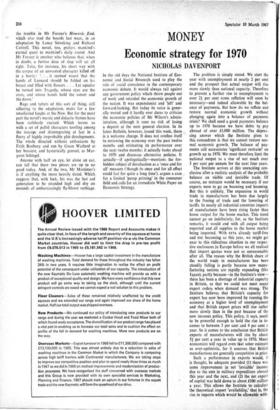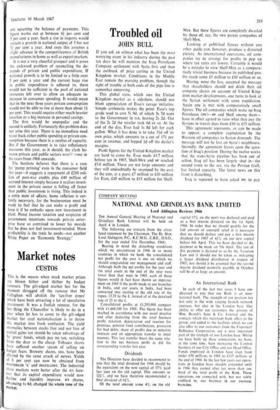Economic strategy for 1970 MONEY
NICHOLAS DAVENPORT
In the old days the National Institute of Eco- nomic and Social Research used to play the role of social conscience in the contemporary economic debate. It would always rail against any government policy which threw people out of work and retarded the economic growth of the nation. It was expansionist and 'left' and forward-looking. But today its voice is gener- ally muted and it hardly ever dares to criticise the economic policies of Mr Wilson's admin- istration, although it runs no risk of losing a deposit at the next general election. In its latest Bulletin, however, issued this week, there. is a welcome change. It does not confine itself to reviewing the economy over the past twelve months and estimating its performance over the next twelve months; it actually looks ahead to 1970 and discusses alternative policies. It actually—if apologetically—mentions the for- bidden subject of devaluation as a 'once and for all' measure (`though its once and for all effect could last for quite a long time'), argues a case for a limited 'pump priming' in the consumer field and calls for an immediate White Paper on Economic Strategy.
The problem is simply stated. We start the year with unemployment at nearly 2 per cent and the prospect that actual output will rise more slowly than national capacity. Therefore to prevent a further rise in unemployment to over 2-1- per cent some reflation will soon be necessary—and indeed allowable by the bal- ance of payments, But how do we reflate and restore normal economic growth without plunging again into a balance of payments crisis? We shall need a good payments balance up to 1970 because we have debts tcr pay abroad of over £1,000 million. The depres- sing answer which the Institute gives to this conundrum is that we cannot restore nor- mal economic growth. The balance of pay- ments still necessitates 'significant restraint' on growth up to 1970. We must therefore limit the national output to a rise of not much over 3 per cent per annum for the next four years.
The Institute arrives at this unexciting con- clusion after a realistic analysis of the probable balance on visible and invisible trade. Of course, no restraint would be necessary if our exports were to go on booming and booming. But this is unlikely. The expansion in world trade in manufactures has been due largely to the freeing of trade and the lowering of tariffs. In nearly all industrial countries imports of manufactures have been rising faster than home output for the home market. This trend cannot go on indefinitely, for, as the Institute remarks, it would end with all output being exported and all supplies to the home market being imported. With EFTA already tariff-free and EEC becoming so this year, we might get near to this ridiculous situation in our respec- tive enclosures in Europe before we all realised that import quotas were not so unreasonable after all. The reason why the British share of the world trade in manufactures has been steadily falling is partly because new manu- facturing nations are rapidly expanding (like Japan), partly because—in the Institute's view— there has been a shortage of industrial capacity in Britain, so that we could not meet many export orders when demand was strong. The Institute believes that Britain's capacity for export has now been improved by running the economy at a higher level of unemployment and that British export prices will rise rather more slowly than in the past because of the new incomes policy. This policy, it says, needs to be powerful enough to hold the rise in in- comes to between 3 per cent and 4 per cent a year. So it comes to the conclusion that British exports of manufacturers will rise by about 51 per cent a year in value up to 1970. Many economists will regard even tbat sober estimate as over-optimistic, for it assumes that British manufactures are generally competitive in price.
Such a performance in exports would, it is thought, be adequate provided (I) there was some improvement in net 'invisible' income due to the cuts in military expenditure abroad this year and the next, and (2) the net export of capital was held down to about £100 million a year. This allows the Institute to calculate the theoretical import 'availability,' that is, the rise in imports which would be allowable With-
out upsetting the balance of payments. This figure works out at between 4+ per cent and 5 per cent a year. Such a rise in imports would sustain a growth in national output of 3 but not 3+ per cent a year. And even this assumes a slight advance in the competitiveness of British manufactures in home as well as export markets.
It is not a very cheerful prospect and it poses the awkward problem of reconciling the de- mands of private and public expenditure. If national growth is to be limited to a little over 3 per cent a year and the current huge rise in public expenditure is adhered to, there would not be sufficient in the pool of national resources left over to allow an adequate in- increase in consumer spending. It would mean that in the next three years private consumption would not be able to rise at more than about 15 per cent. This would require either much heavier taxation or a big increase in personal savings.
The first would be unpopular and the second is unlikely. Fortunately this problem does not arise this year. There is no immediate need to cut back either public spending or private con- sumption because there is a surplus of capacity.
But if the Government is to take reflationary measures this year, as it should, the clash be- tween private and public sectors woule come in the years from 1968 onwards.
The Institute believes that there is a case for 'pump priming' even in the consumer field this year—it suggests a repayment of £210 mil- lion of post-war credits plus £40 million of accrued interest simply because it realises invest- ment in the private sector is falling off faster than public investment is rising. This indeed is a sorry state of affairs. Some reflation is cer- tainly necessary, for the businessman must be made to feel that he can make a profit and keep it if be embarks upon new investment in plant. Penal income taxation and suspicion of government intentions towards private enter- prise have so contrived to lower his morale that be does not feel investment-minded. More profitability is the tonic he needs—not another White Pape'r on 'Economic Strategy.'































 Previous page
Previous page